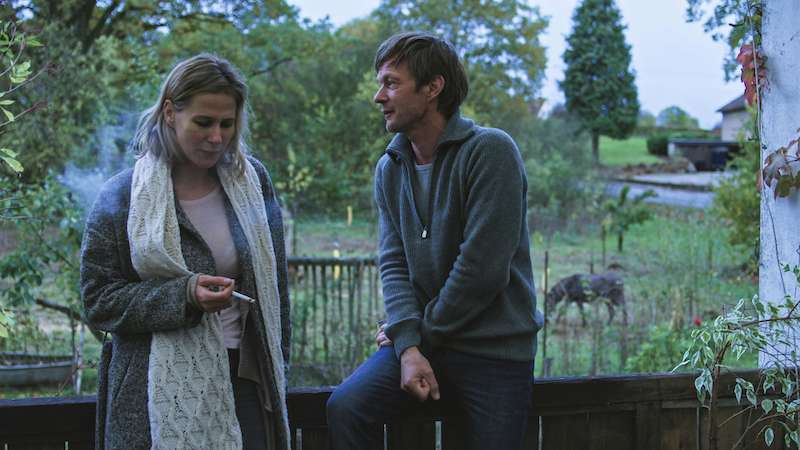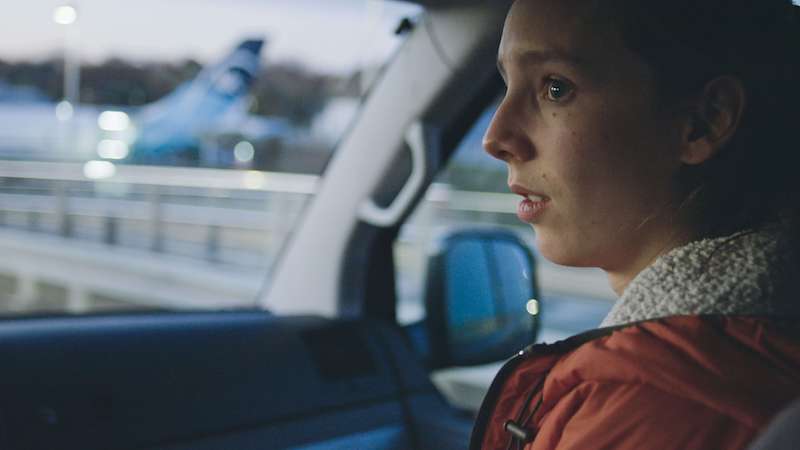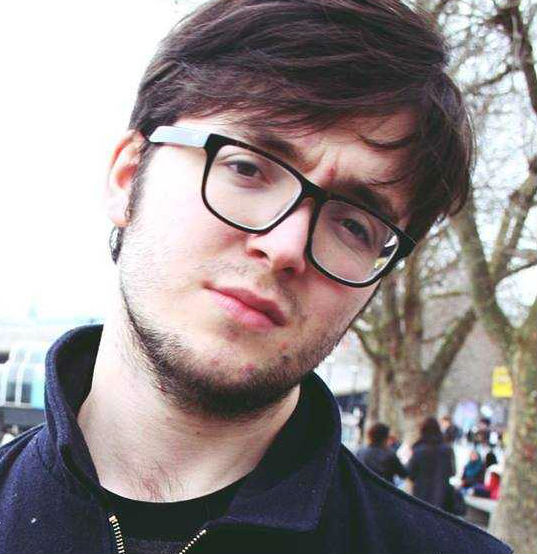




The movie A Voluntary Year (Das Freiwillige Jahr), which played in competition at the 72nd Locarno Film Festival, is the second film in two years from Ulrich Köhler after In My Room (2018). Co-directed with Henner Winckler, it tells the story of generational conflict. A father drives his daughter to the airport to take part in a voluntary year in Costa Rica. But when her boyfriend Mario resurfaces, she finds herself unable to truly figure out what she wants, much to her father’s chagrin. The result is a bitterly funny exploration of home, father-daughter relationships and the inability to see past one’s own perspective. We sat down with the two directors to discuss the process of making the film, what the actors brought to the film’s point-of-view and how to maintain narrative conflict when your characters refuse to change.
Read our A Voluntary Year review here!
…
.
Redmond Bacon – What was the main idea behind the film?
Ulrich Köhler – The main idea was to make a film together. During Sleeping Sickness (Schlafkrankheit, 2011) I felt: “This is really too much for one person.” It’s a very uncreative process because you never have a view from a distance where you can say: “This is the problem” or “This is the possibility.” This was the first starting point. Then we have a lot of matching biographical experiences. We are both fathers of children and we hope for them to have a happy life. We have a certain vision of life but we have to learn that our vision of life is not automatically the thing that will make them happy.
RB – The film deals with the concept of a Voluntary Social Year: a strong concept in German culture. Can you tell me more about what it means?
Henner Winckler – We had military service as a duty for our generation. When they stopped it they invented this idea instead. Lots of kids go abroad. I’m not sure if it’s always a good idea. These young people are not trained for anything. They go into the world and they want to help, but they don’t know anything. For the young kids it’s very interesting. For the countries they go to, I’m not sure it’s really helpful.
UK – You’re not automatically an expert just because you went to school in Germany.
HW – It’s controversial.
RB – Is it a hangover from colonialist ideals?
UK – It was a very populist move from a Social Democratic Chancellor, Gerhard Schröder, who wanted to say that he’s doing something for the Third World. In a way it’s neo-colonialism. It’s absurd to think that just because someone went to high school in Germany he’s automatically highly qualified to help people in less privileged parts of the world.
RB – The film flips stereotypes on their head. In conventional cinema it’s usually the daughter who wants to break free and the father who wants her to stay at home. Here it’s the other way around. Was this a conscious decision?
HW – On the one hand yes. On the other hand this is something we experienced as well. In our generation the parents think this is how it should be, to go out and see the world, but some just want to stay. They have their friends. There is no need to go abroad because they have everything on Netflix.
RB – The use of perspective in the film is very interesting. There are no crosscuts between characters. We only switch if they have interacted in the same scene. Is this an intentional move to immerse us in the lives of these characters?
UK – It comes from the formal idea that a lot of this film should take place in the car. And that the car was like a relay race. Every time someone has the car, then we’re with them.
HW – This was one of the main ideas when we started: to tell the story from the view of a car.
RB – It’s funny because it’s a Volkswagen Camper Van too.

UK – That’s like the embodiment of socially liberal Utopia. There were those parents who went on traditional vacations in hotels in Lago die Garda or Rimini. Then there were those like our parents, who either had a boat or a VW van and went wild camping in France.
RB – This generational change forms the conflict between father and daughter. I found it to be bitterly funny; a dark comedy of awkwardness. Would you agree?
UK – For me it’s a situational comedy. Humour is always a question of perspective. If you go back far enough in history, then even the war between Gallics and Romans can become comedy. Something that feels very serious and very emotional for a person when they’re living through it, might seem very different when he looks at it from the outside or five years later. That’s how humour works for me.
RB – A lot of this humour rests upon the performance of Sebastian Rudolph. Did you have him in mind when you were writing the screenplay together.
HW – We had a different character for both the father and daughter in mind. We thought it had to be a “real man” with a beard.
UK – A patriarch.
HW – And for the daughter we had a more narrow-minded girl in mind. So the father is ashamed of his daughter. When we started casting it felt like a cliché. Instead, Sebastian Rudolph’s Urs is more like an older teenager, a softer type, and Jette is much stronger than we thought. She’s not someone who has no idea what to do. She’s just jumping from one thing to another and this makes it more complex.
UK – If you look at what Maj-Britt Klenke made out of this character, it’s very different. We really had the desire to make a film about a boring girl. I found it a dramaturgically risky but interesting thing to do.
RB – In most films people change their perspective from the beginning to the end, but here no one seems to change. How do you keep the narrative full of conflict while characters don’t fundamentally change their perspective?
UK – I think on a superficial level it’s quite simple dramatically. It’s like a film where a bomb is ticking. You always have this decision: Is she getting on the plane or not? When she changes her mind, it restarts, and you have the new decision. If you look at it from a purely analytical, formal and superficial point of view, this very primitive dramaturgy keeps the film going. It’s very character driven but also very plotty in a way.
RB – I thought fundamentally the way father and daughter react to situations is actually quite similar. They’re both impulsive characters. Were you trying to show how father is like daughter and vice versa?
UK – When I look at the film, I’m amazed how much the daughter behaves like the father. It’s not something we had felt strongly.
HW – The idea was the opposite: there’s one that makes decisions and one who can’t make decisions. Now we say the way she behaves with her boyfriend Mario is quite similar.
UK – It’s something I really love because it shows that filmmaking is a process. You start something then it has a dynamic of its own. You’re not just fulfilling an idea you had five years ago.
RB – Ulrich, there were seven years between Sleeping Sickness and In My Room. Now there’s only one year between In My Room and this film. How did you turn around a new film so quickly?
UK – That’s not our decision. That’s the decision of the film funding system. We just had the opportunity to make the film as a TV movie. For me it was an interesting experience. For the first time I felt like a professional director. Otherwise I always start from scratch. This time I was well aware of how the process works.

RB – It seems films for TV can be made a lot quicker.
UK – That was interesting for me. It gave me the feeling that there’s less to lose. That gave me and the actors a certain amount of freedom. It was an interesting experience and it will change the way I work.
RB – I want to talk about the character of Murat, the refugee. Urs says that he will take him in but due to personal circumstances he changes his mind. Is this a pointed comment on how the response to migrant crisis in Germany changed from openness in concept to more complicated in reality?
UK – Yeah. It’s easy to say “welcome” but it’s not so easy to give Murat a room when you’re in a big crisis with your daughter. It’s understandable he doesn’t want Murat in that situation. At the same time it’s very consequential. I think we’d all like to be better people, but we also don’t really want to give away too many of our privileges.
RB – Ulrich, you wrote a political essay around ten years ago explained why your art isn’t political. Have you changed your mind on this?
UK – The point I was making is that filmmaking is not a political action. Well, everything is political. Taking a shower is political. But in a narrow definition, filmmaking is not political. If you want to change the world actively, change it actively: it’s not the reason why I make films. I think there’s a hypocrisy in making a film out of creative or commercial ambition and thinking that you’re changing the world.
RB – Are you two planning to work together on your next project? Have you got anything in mind?
HW – Vacation.
UK – I’m sure we’ll work together in one way or another. I’m not sure we’ll work together directing again.
HW – I think first we want to do our own stuff but I never know how it will.
UK – [laughing] When he’s deaf and I’m blind we will do the next film together.
















